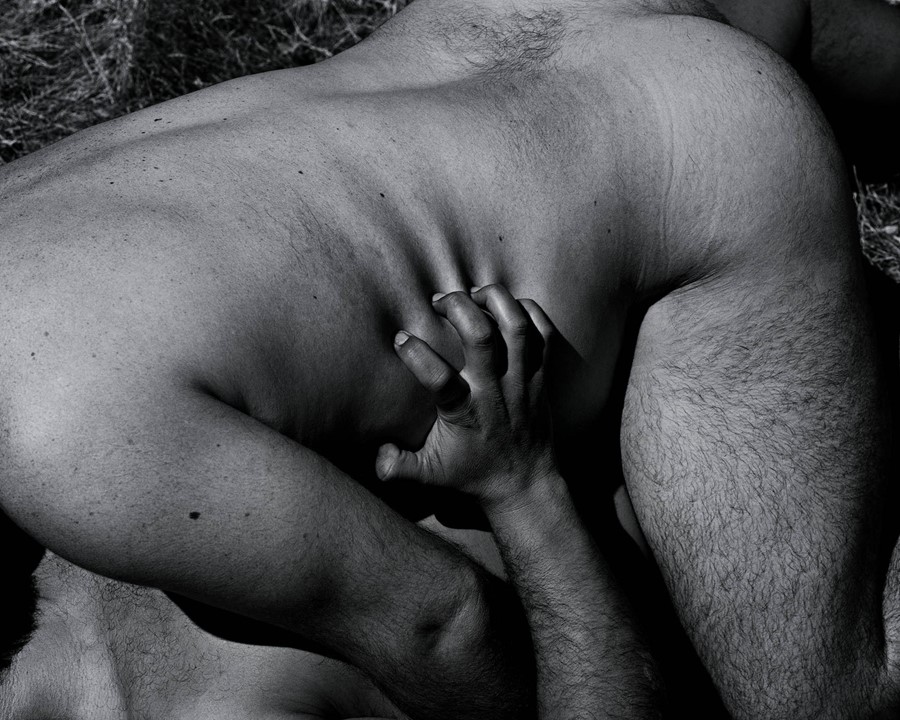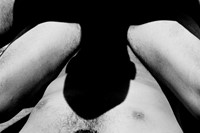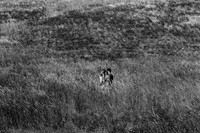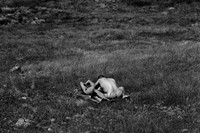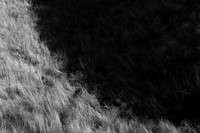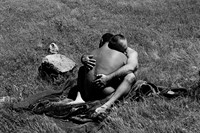Mark McKnight shares the story behind Heaven is a Prison, his new photography book set in the Southern Californian desert
A disclaimer before entering artist Mark McKnight’s website breaks down his photographs’ content with an ebb-and-flow between the bodily and the earthly. “Piss” is tailed by “grass” and “cocks” follow “rocks”. This oscillation of texture and form echoes in the artist’s new monograph Heaven is a Prison, published by Marseille-based publisher Loose Joints. In sun-cast black and white images, two nude men surrender to desire amid a barren Southern Californian desert, which stretches as far as his lens captures. The result is something close to visual poetry: “the work is not a narrative in any conventional sense,” McKnight says – much like most poems – but “a body and landscape quandary, only because those happen to be the literal subjects I’m describing”.
The photographs pursue the duo as they coalesce. A scorching effect is seen most vividly in a shot of a lifeless tree carcass, or in pictures of urine thinly gushing from one man’s penis onto the other’s face. In their moment of intimacy, penetration resembles rainless hills. “That’s the root of my attraction to depicting things synonymously,” McKnight admits about his interest in “collapsing a variety of distinctions between things that appear to be fixed”. His series Decreation (2017–ongoing) establishes this thinning separation between nature and body – Earthskin, 15 captures a land punctured with two bodily orifices and in An Island, a man’s densely hairy earth-stained rear is unrecognisable from soil.
In his new publication, a curved back leading up to hair-dotted buttocks embodies what he calls “rock-solid topography of the high desert, which resembles not only corporeal but also waves in this book”. If photography’s given sensation is seeing, McKnight challenges this with tangibility, the feeling of touching pages, similar to a body – the “inherent intimacy of a book,” as he describes. The monograph, which is supported by New York-based art organisation Light Work’s annual Photobook Award, includes an essay by author Garth Greenwell. Having transferred his pictures from walls to pages, McKnight shares with AnOther his journey of orchestrating “an experience that is both physical and psychological for the viewer”.
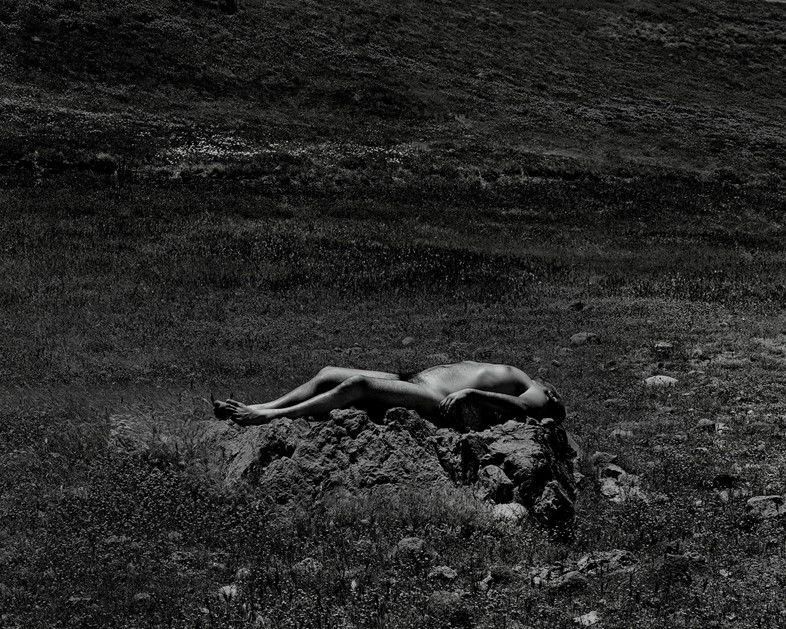
“Installation is an integral part of my practice. In exhibitions, I employ scale as a means of drawing parallels between a multitude of photographic subjects. The decisions I’m making are equal parts aesthetic and psychological: certain images necessitate distance through the grandeur of their scale, while smaller works may draw you near, only to refuse you in their blackness. Forcing an audience to move to and fro is a way of activating a viewer’s awareness of their own body, a reminder of one’s own corporeality that inevitably solicits empathy, speculation, or curiosity about the content I’m depicting. There are moments in which I want someone to turn away from a photograph only to be met with a kind of figurative or formal echo of that image in a picture of something else, something seemingly unrelated. I think it’s those decisions that make the inherent poetry of the work legible.
“This project was uncharacteristically conceived, first and foremost, as a book. That meant forfeiting the use of scale in the ways to which I had become accustomed. Privacy, intimacy, and transgression are things that I knew needed to be emphasised through design. The book comes wrapped in an image of a cloud that has to be ruptured, defiled in order to access – even liberate – the content. It’s a gesture that also makes a viewer complicit in my ‘voyeurship’.
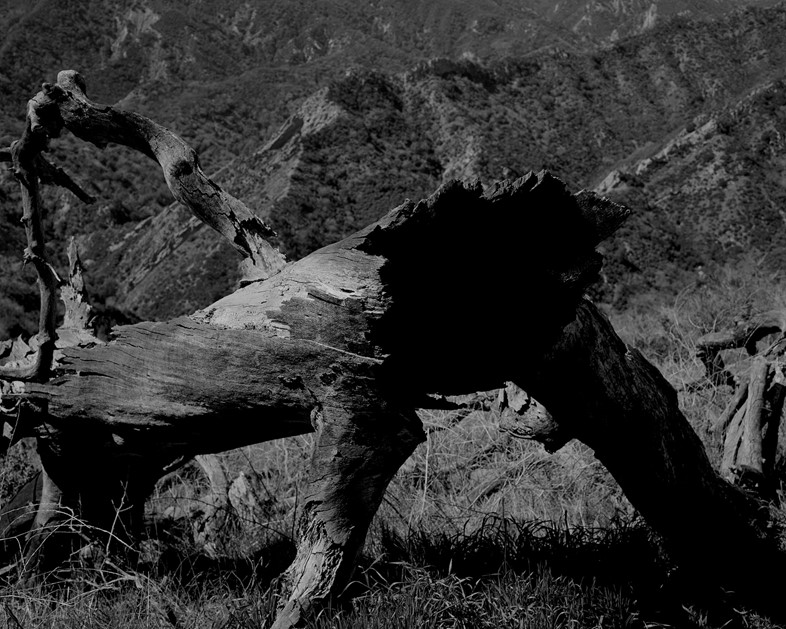
“I chose the title Heaven is a Prison with the intention of evoking Judeo-Christian notions of paradise, but it’s not exactly a re-imagining of the book of Genesis. I’ve always been fascinated by the way that the Bible, one of the most widely read religious books in history, begins with a creation myth that involves free will, intimacy, shame, desire, pleasure, punishment, paradise, access, devotion, and slavery – to God! – as a form of salvation. It’s reminiscent of BDSM. I think the subjects in my book are actually quite Sisyphean. I wanted a viewer to imagine these men and this landscape as being bound, for better or worse, by a kind of universal cycle.
“I take solace in the timelessness of my experiences and emotions and I have an innate desire to produce timeless queer artworks because I grew up feeling like eternity was reserved for heterosexuals, a fear that has continuously been reaffirmed both by major world religions and the canon of art history.
“One of the sequences in this book starts with a photograph of one of the subjects on his knees, in the dirt, mouth agape, desperate. In the foreground we see the out-of-focus ass of the other protagonist. The end of that sequence is a nearly identical photograph, made just seconds later, in which the same subject, is still on his knees albeit ecstatic. He is the recipient of a face-full of that which he was so desperate for: piss. It’s about desire, and those things which we beg from others in our intimacies. It’s as much a self-abasement as it is a christening. That sequence intentionally has so many blank pages after it to convey that sense of relief, taking a breath before entering the next sequence.
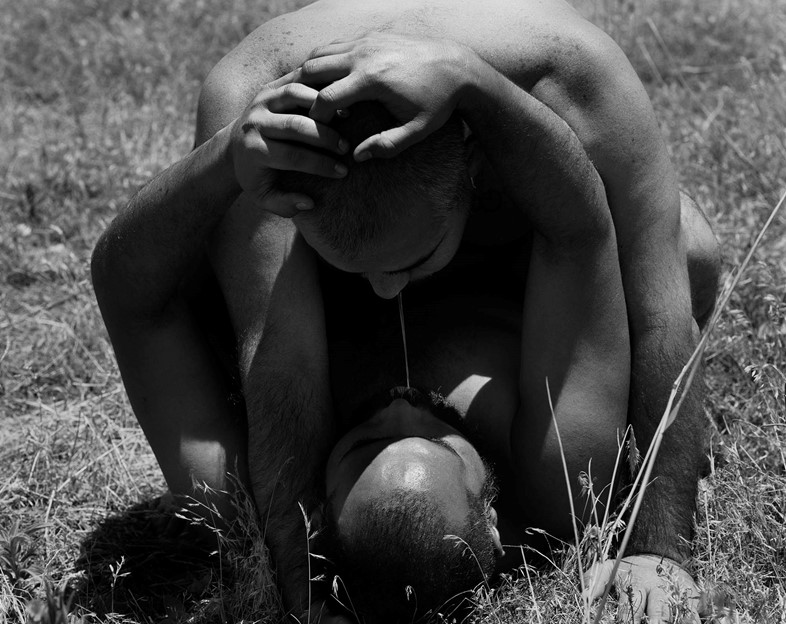
“I think I’m fascinated by piss because it is essentially water. It is literally of the landscape – streams, rivers, lakes, oceans – but also, it is constitutive of us. To piss is thus to evacuate or expel the self. To piss on someone is not only profoundly intimate, but it’s also a kind of bestowal, a giving of that self. It is as if to say, ‘I bathe you in me’. If that’s not transcendent, meaningful and romantic, I don’t know what is.
“Making pictures came very naturally in [Californian] topography, not out of a sense of ownership, but of belonging. I grew up hiking in these places. On the other hand, it’s a relatively conservative region of southern California on the periphery of Los Angeles. And so this landscape functioned two-fold: a place in which I found respite and solitude, and as a place in which I never felt completely safe. I’m always retroactively self-psychologising, unpacking my unconscious decisions. In his essay, my friend Garth referred to this facet of the work as ‘a utopic redemption of the past’. I love that line.”
Heaven is a Prison by Mark McKnight is out now, published by Loose Joints
